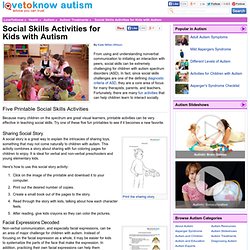

Social Skills Activities for Autistic Preschoolers. From using and understanding nonverbal communication to initiating an interaction with peers, social skills can be extremely challenging for children with autism spectrum disorders (ASD).

In fact, since social skills challenges are one of the defining diagnostic criteria of ASD, they are a core area of focus for many therapists, parents, and teachers. Fortunately, there are many fun activities that can help children learn to interact socially. Five Printable Social Skills Activities Because many children on the spectrum are great visual learners, printable activities can be very effective in teaching social skills. Try one of these five fun printables to see if it becomes a new favorite. Social Development Note 5. Activities For Children's Emotional & Social Development.
Activities that stimulate social and emotional development can enhance your child's ability to relate with others and boost feelings of confidence.

Social and emotional competence is important for academic and occupational success. Healthy social and emotional skills can reduce the chances of risky behaviors and prepare your child for the challenges of life. Recognize the uniqueness of your child's interests. Find community programs, after-school activities, sports or classes that foster growth in those areas. Acknowledge accomplishments and provide encouragement to nurture your child's participation in these activities, suggests the Edutopia website, a project of the George Lucas Educational Foundation. Social Development Note 4. Social Development in Preschoolers. At age three, your child will be much less selfish than she was at two.

She’ll also be less dependent on you, a sign that her own sense of identity is stronger and more secure. Now she’ll actually play with other children, interacting instead of just playing side by side. In the process, she’ll recognize that not everyone thinks exactly as she does and that each of her playmates has many unique qualities, some attractive and some not.
You’ll also find her drifting toward certain children and starting to develop friendships with them. As she creates these friendships, she’ll discover that she, too, has special qualities that make her likable—a revelation that will give a vital boost to her self-esteem. Social Development Note 3.